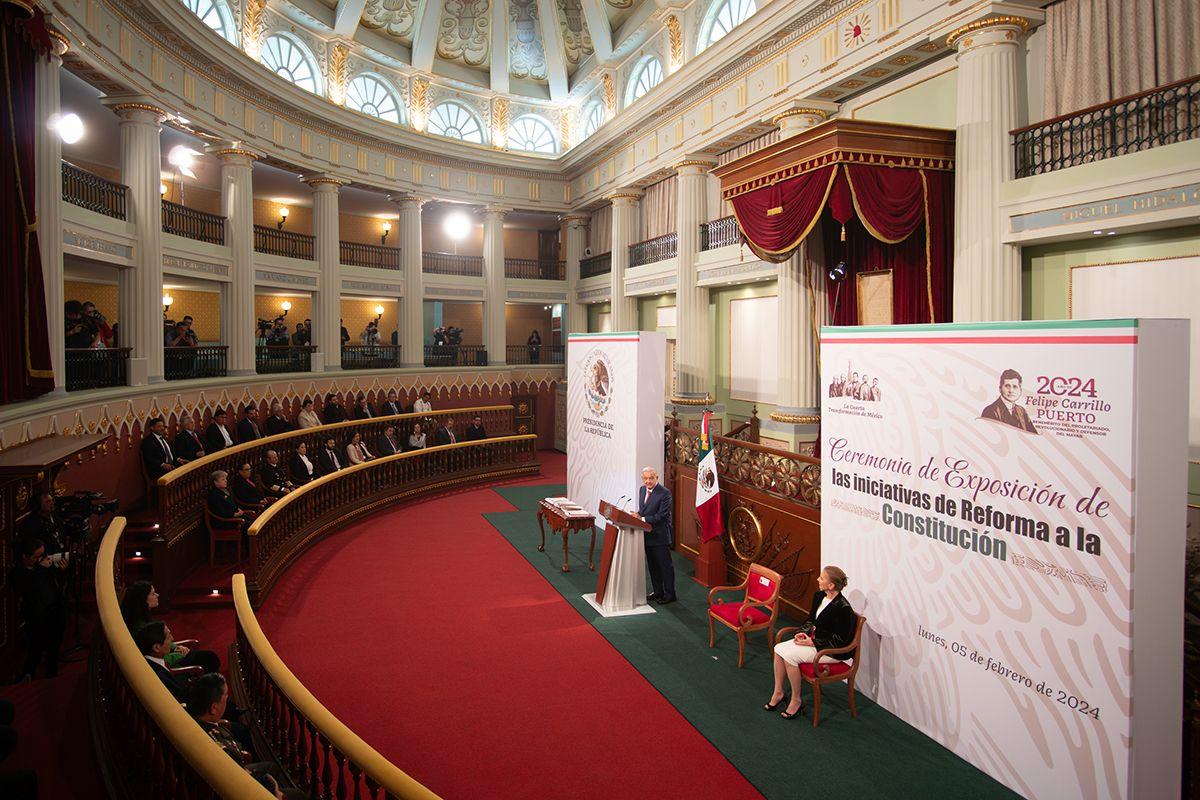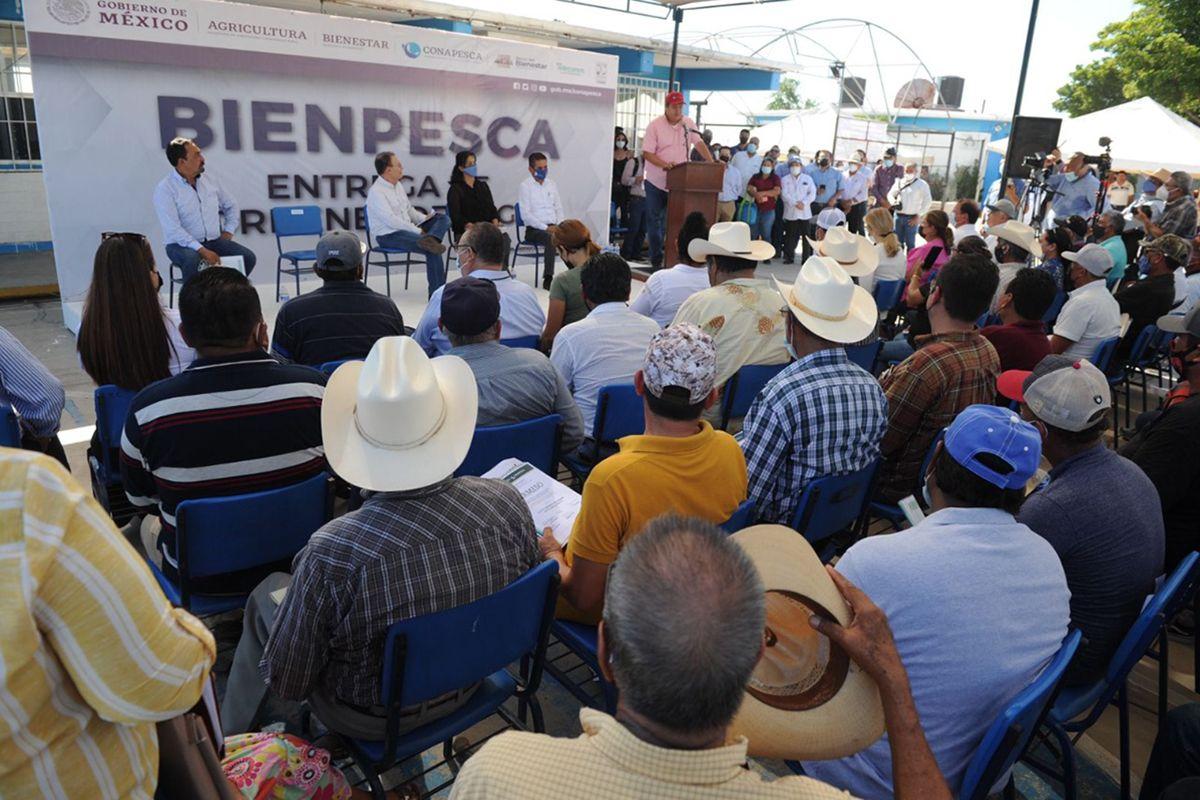President Andrés Manuel López Obrador seeks to have his social programs included in the Constitution. The foundations of Youth Building the Future, welfare pensions for older adults, people with disabilities and students from low-income families, Sembrando Vida and Bienesca, were included in the package of 20 reform initiatives (18 constitutional and two legal) presented on February 5.
The proposal is presented during the electoral process months before the president ends his six-year term. However, several analysts question whether it will be possible to obtain the approval of the Congress of the Union.
“The viability exists today, although for some of these programs it is not clear how much money is coming from... In general, it's a difficult bet. It doesn't seem like he's going to succeed in terms of positioning all his reforms and getting them approved,” explained Marco Arellano Toledo, political scientist and professor at the National Autonomous University of Mexico (UNAM).
In an interview with Causa Natura Media, Arellano pointed out four problems in raising social programs to a constitutional rank: rigidity, pressure on public finances, inequity and limited autonomy for the following governments.
In the case of rigidity, the political scientist explained, there is a risk that programs will become inflexible in the future in the face of new needs that arise for the populations that receive support. There could also be financial pressure, as a significant and sustained long-term budget allocation will be required. This can lead to a third problem, which is inequity in the future as to whether certain groups of the population benefit more.
“Today we know that these people need this support, tomorrow we don't know if these people and others will need it or if those who receive the support will probably no longer be necessary or there will be a need to change the focus. There is a problem of inequity because you assign to constitutional rank what today is your diagnosis of a problem of poverty in the country, but in the future you don't know it because it can change,” Arellano said.
In addition, the specialist said that these three problems may result in a fourth, which is the limitation of the autonomy of the next government, since the decision-making capacity of successor presidents would be adjusted to the social programs that are already in place by constitutional decree.

Bienesca, a debt to fishermen
One of the five reform proposals included in President López Obrador's social programs includes the Sembrando Vida and Bienesca programs, two subsidies that during this six-year term focused on small-scale peasant and fishing producers.
“Farmers and fishermen will continue to receive direct support from the Production for Welfare program. Guarantee prices will be maintained for the purchase and sale of basic foods and free fertilizer will continue to be delivered to all small producers in the country to comply with a basic act of justice: that those who feed us eat,” said the president.
However, Bienesca, which consists of the delivery of 7,500 pesos a year to fishermen, has been a program criticized by the country's fishing cooperatives. Mainly due to flaws in the register stating that not all the beneficiaries are fishermen.
“If it were a well-executed program, I would have a list of real fishermen who know who we are, what we are fishing, where we are working, but it is a program that is not clear about the strategies of how to apply it, because at the end of the day there is a lot of need in the sector, but we are not finding the formula to make it work,” said Yanett Castro, president of the cooperative “Almejeras de Santa Cruz”, in Altata, Sinaloa, and president of the Network of Women of Fishing in Mexico “Sustainable Tide”.
Castro added that the inclusion of those who are part of the fishing sector throughout the value chain, mainly women, is also pending, since Bienesca focuses on workers who are at sea and leaves out those who are part of the fishing communities and are in the value chain with work that ranges from pre-production to post-production.
Before Bienesca, there were about 12 subsidies that were provided for different needs such as fuel, inspection and surveillance, modernization of the fishing fleet and fishing management.
The money came to the cooperatives that bring together the fishermen and was divided as needed. However, the López Obrador government sought to eliminate middlemen and began delivering directly to each worker through Bienesca.
For several fishermen, this meant a change in their way of organization and, currently, there are those who believe that the previous model should return. Although for other workers like Yanett Castro, the bet should be on the future of sustainable fishing and on adapting the needs of support to fishing regions.
“That saying of 'give him a fish to eat now, teach him to fish to eat tomorrow' has not been applied by the law to fishermen,” Castro said.
Marco Arellano agrees with the focus on social programs. Since, in the case of Bienesca, there are fishermen who have more opportunities because they are in development areas such as tourism, but those who are in ports or bays farther away from the production poles are also beneficiaries.
“The view of most international bodies is that universal welfare programs such as those of President López Obrador are programs that promote institutional and social laziness. What does this mean? That resources are given, but they do not leverage people's development. On the contrary, those with a focused approach as if there is research and characterize the groups to which support must be given, when they receive it, it has been observed in different studies if they transform life, the branch of production or the economic process,” Arellano explained.
Although adding social programs such as Bienesca to the Constitution may require a review of the amounts and the frequency that will be established in secondary laws, for female fishermen like Yanett Castro it is necessary to seek other solutions to fishing problems such as lack of social security, overfishing or illegal capture.
“Certainly there are no people in the Chambers of Deputies or Senators who understand the fishing system well... The sector is good and the support is much needed, but it has been poorly focused. As long as we don't have clear rules for how the program works, it's going to continue to be a conflict,” he concluded.



Comentarios (0)